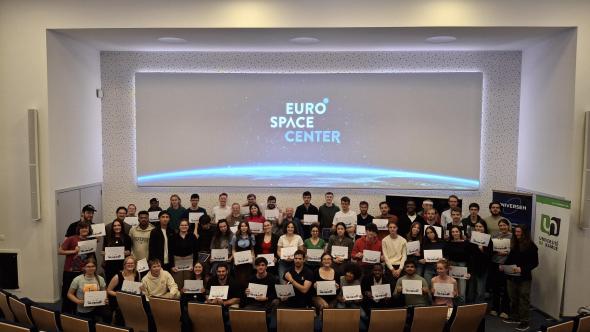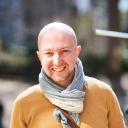Spring School UNIVERSEH 2025: Students from all over Europe meet in Belgium
Around 60 European students from the UNIVERSEH alliance gathered in Belgium during the last week of April for Spring School 2025, organized by the University of Namur.

Around 60 European students from the UNIVERSEH alliance gathered in Belgium during the last week of April for Spring School 2025, organized by the University of Namur.

This edition was held at the Euro Space Center, an emblematic venue dedicated to the discovery and exploration of space. Placed under the theme "Space is all around us", the Spring School aimed to raise students' awareness of the many facets of the space sector, as well as its impact on society.
For one week, participants were immersed in an intensive program combining theoretical courses, practical activities, training inspired by astronaut training and collaborative projects. This unique experience enabled students to project themselves into their future careers in the space sector, while exchanging ideas with teachers, researchers and industry professionals.
A formative and inspiring adventure that confirms the importance of such initiatives in awakening vocations and strengthening the links between science, technology and society.
The Spring school took place at GALAXIA, the only business park in Belgium entirely dedicated to space innovation and applications. The Euro Space Center, the space theme park at the heart of GALAXIA and a key partner of UNIVERSEH, welcomed students throughout the week.
It is essential for the university to integrate key players from the space sector into the Spring School. No one goes into space alone, training the next generation of space professionals is a collective effort. This requires close collaboration with those who are already active in the field: from researchers at universities and research centers to our colleagues in space education at institutions such as the ESA Academy. We also collaborate with private companies and experienced professionals eager to pass on their valuable expertise. André Füzfa, Professor at the University of Namur and coordinator of the Spring School.
Each morning, students attended lectures led by a panel of experts from a variety of disciplines. Speakers included André Füzfa (UNamur), Marc Toussaint (ESA/EPFL) and Natacha Callens (ESA Academy), as well as specialists such as Fabienne Delhaise (ESA), Elisa Tasev (Royal Observatory of Belgium) and artists Alessia Sanna and Alexandre Weisser. The program also counted on the participation of Loredana Santo (University of Rome Tor Vergata), Alix de Beusscher (Aerospace Lab), Christophe Bénaroya (Toulouse Business School), Alain De Neve (Royal Military School of Belgium), Gabrielle Leterre (University of Luxembourg) and Jacques Arnould (CNES), offering students a rich, interdisciplinary perspective on space science and policy.
Themes covered a wide range of topics: launchers, astrodynamics, space and terrestrial segments, planetary and space defense, smart materials for space applications, cybersecurity, economics, law and ethics of space activities, space policies and art.

If we want to give students the means to succeed in life, as committed citizens and future professionals in the space sector, we need to rely on a solid network of partners to help them discover the many facets of this field. That's why we're inviting passionate experts to share their knowledge and experience with them.
During the week, students enjoyed unique and privileged access to two key sites of the European Space Agency (ESA). They were able to visit, the ESA Academy Training and Learning Centre, where they discovered how the agency collaborates with universities to pass on its expertise, technical skills and best practices to the next generation of European space professionals.
They also visited ESEC-Redu - the European Space Safety and Education Centre - which gave students a better understanding of satellite operations, space safety initiatives, as well as Smallsat and Cubesat mission management. These visits offered students the chance to learn more about the initiatives that support Europe's space ambitions.
The afternoons were devoted to activities at the Euro Space Center and ESEC, where students practiced simulations, coordination exercises and mission planning.
The highlight of the week was the "ArMoongeddon Group Concept Study", a team challenge during which students developed a proposal for a fictional space mission focusing on asteroid deflection for lunar mining. The project involved dealing with multidisciplinary issues involving engineering, economics, law, ethics and more. On Saturday morning, the teams presented their concepts to a jury of experts and peers, demonstrating their technical creativity and collaborative problem-solving skills.
"The team-building activities and concept study are an opportunity to highlight the diversity of intelligences and the importance of interdisciplinary approaches to tackling space-related challenges. The space sector requires a wide range of skills. André Füzfa, Ordinary Professor at the University of Namur and Spring School coordinator.
The Spring School also served as a bridge between students and potential employers. ESA Academy staff and industry representatives led career sessions and a space job forum, offering insight into internships, graduate positions and research pathways.
The evenings were just as rich, punctuated by lectures and star-spotting sessions that fueled wonder and sparked discussions well into the night.
UNIVERSEH (European Space University for Earth and Humanity) is part of the ‘European Universities’ initiative promoted by the European Commission. Its ambition is to develop a space that will meet the societal, social and environmental challenges arising from European space policy.